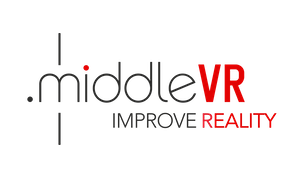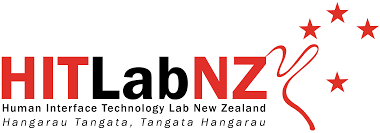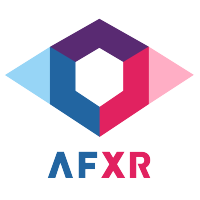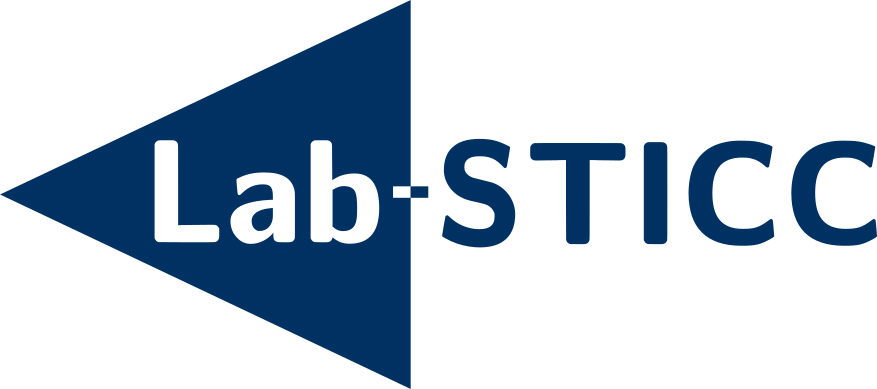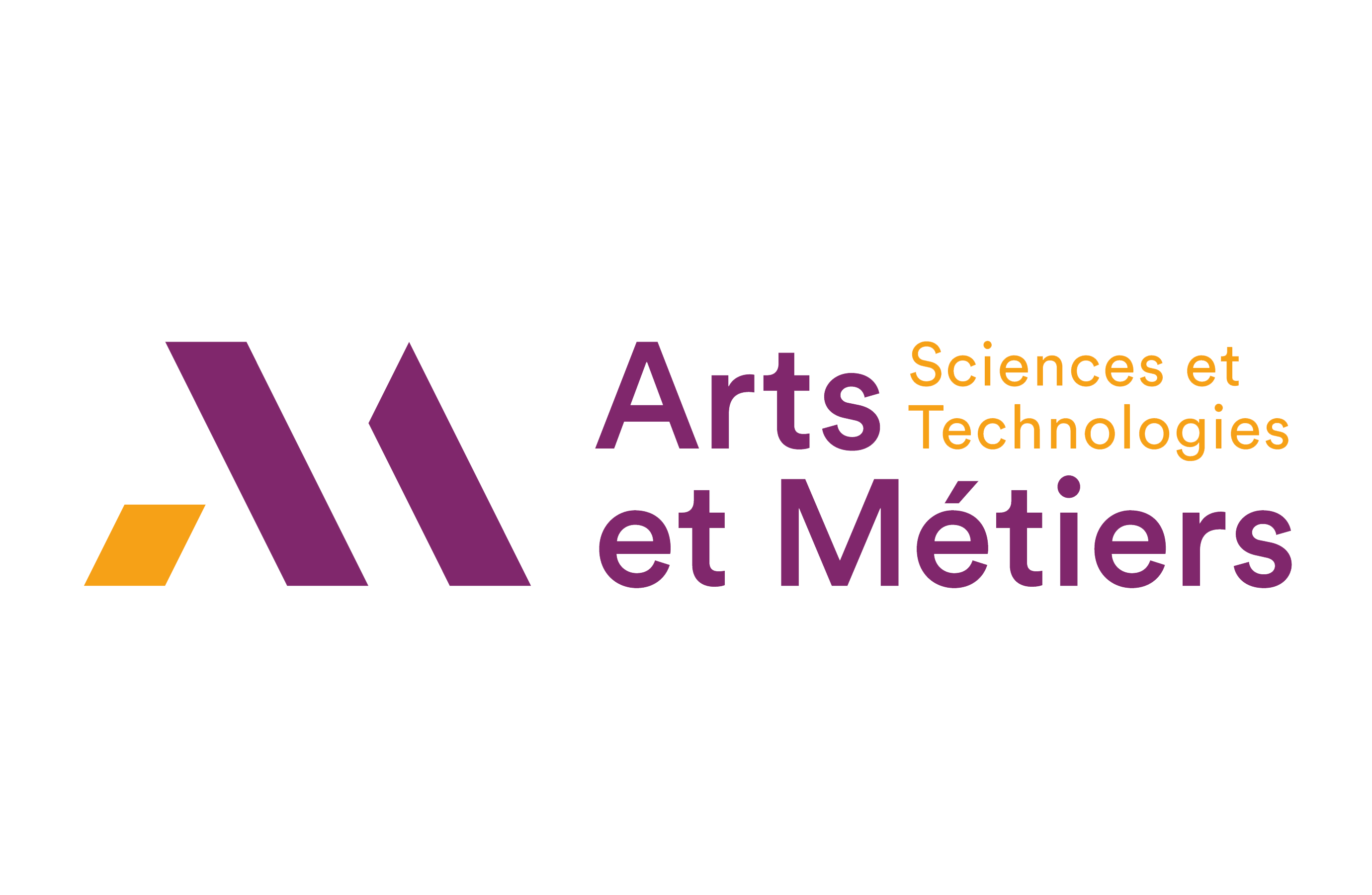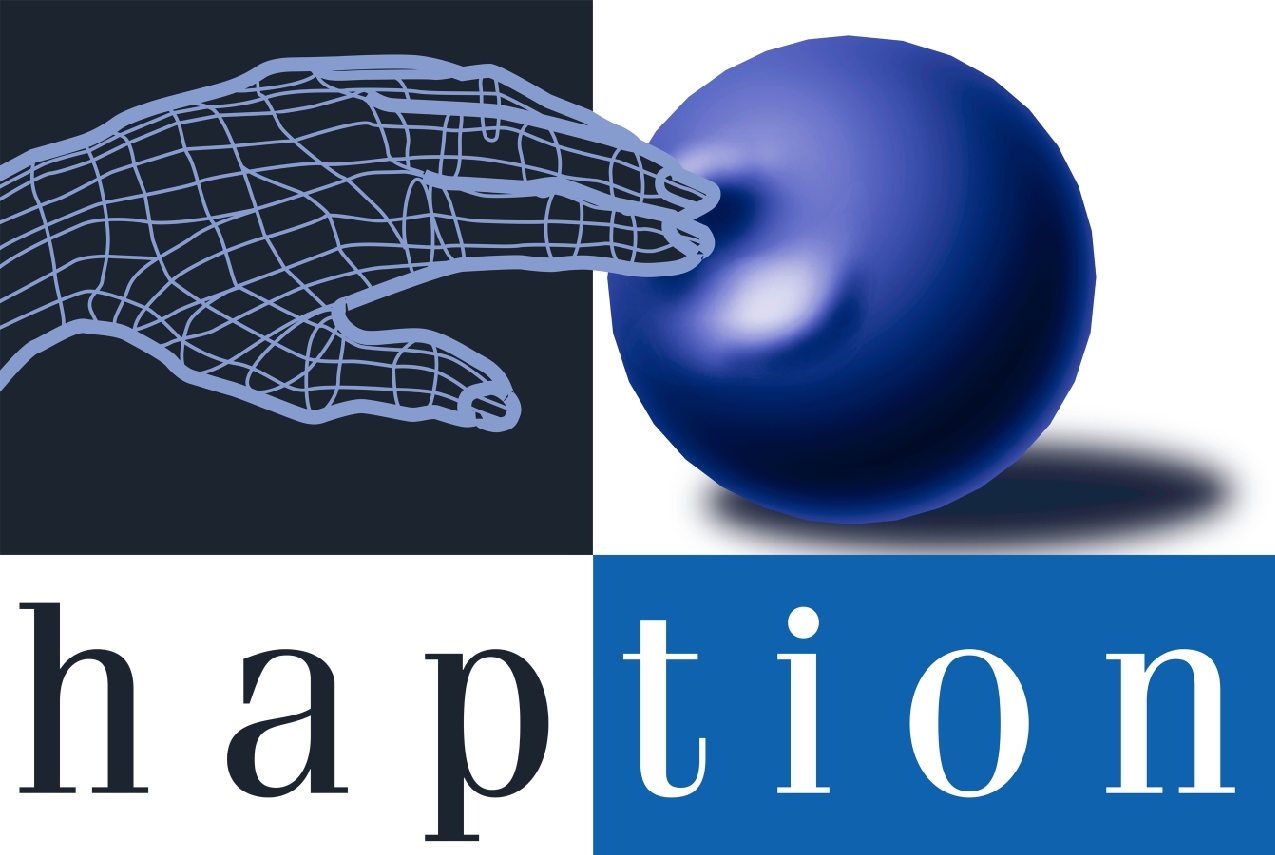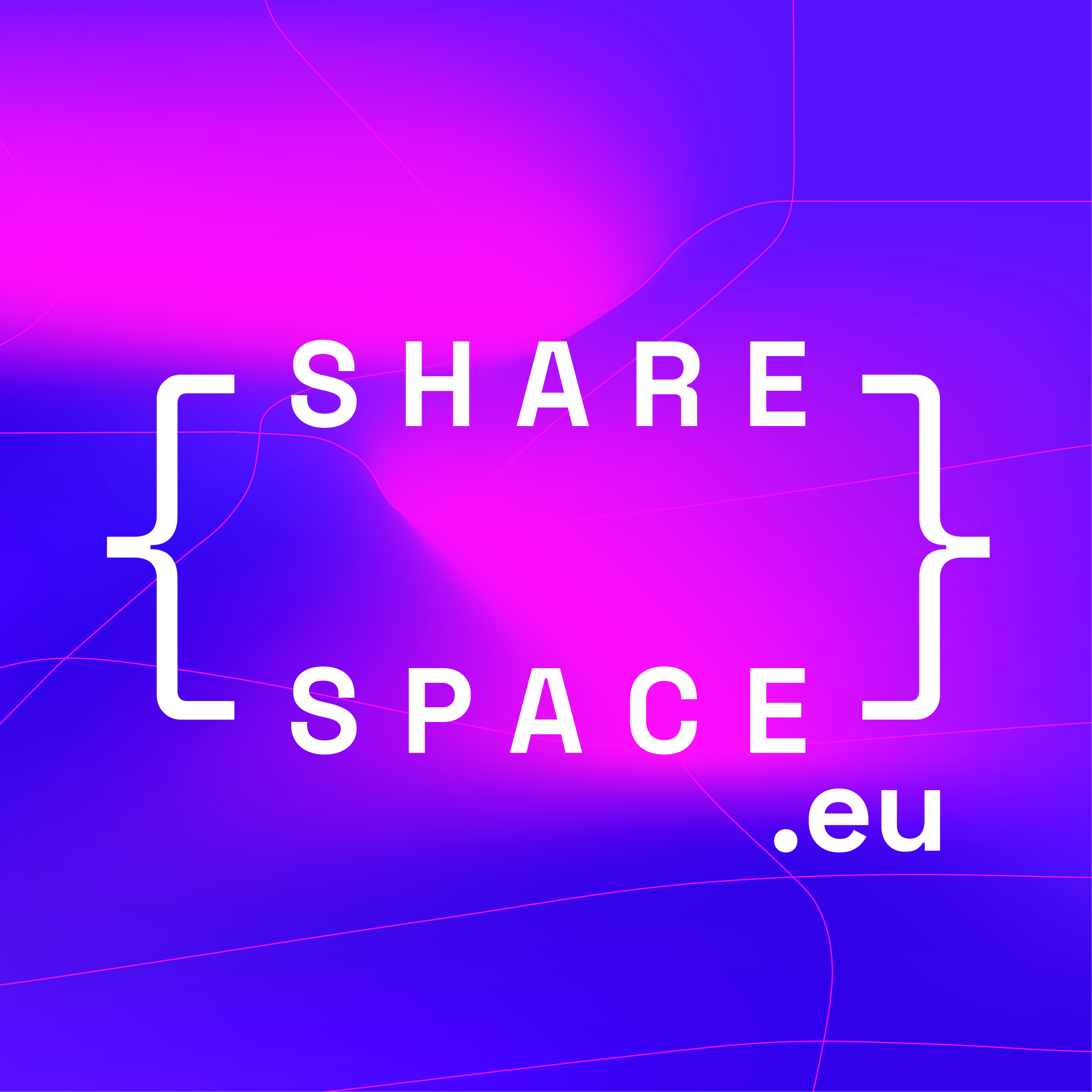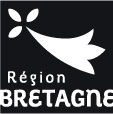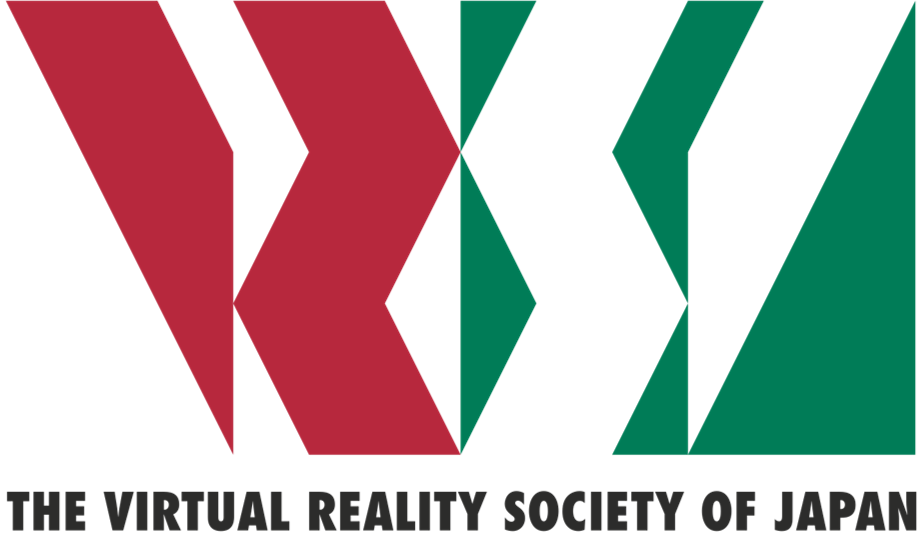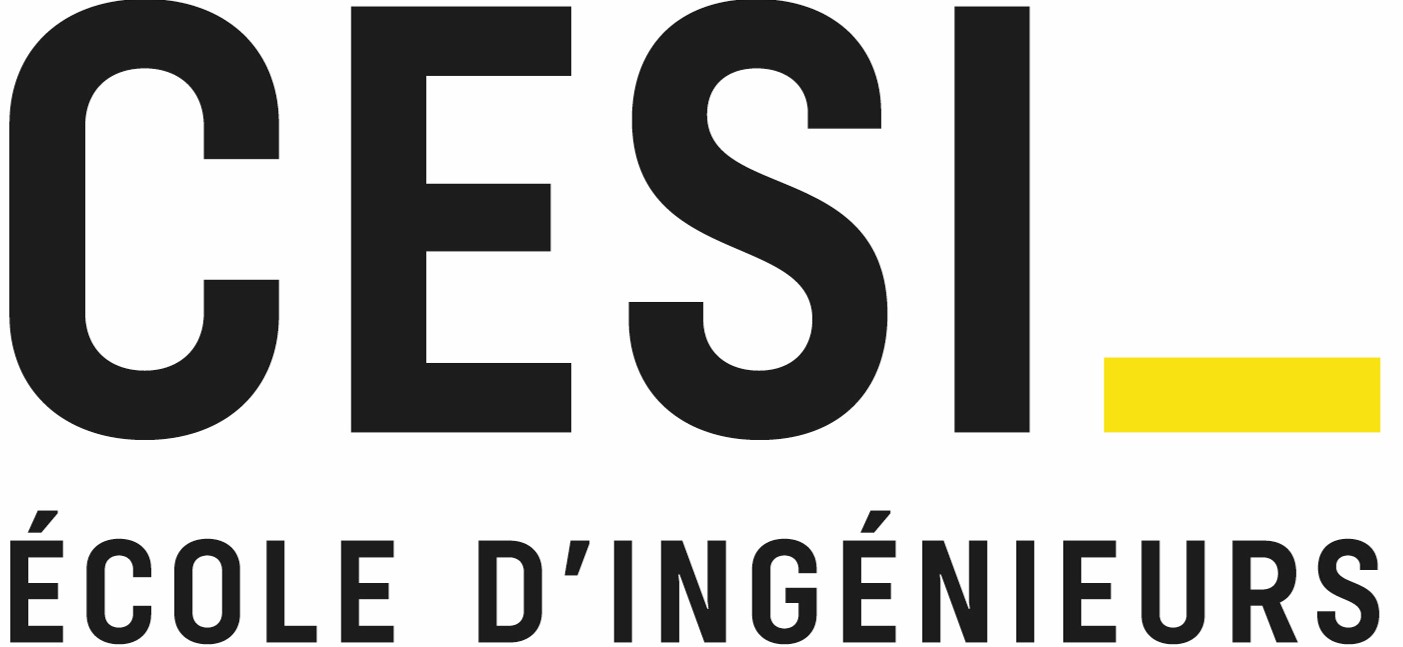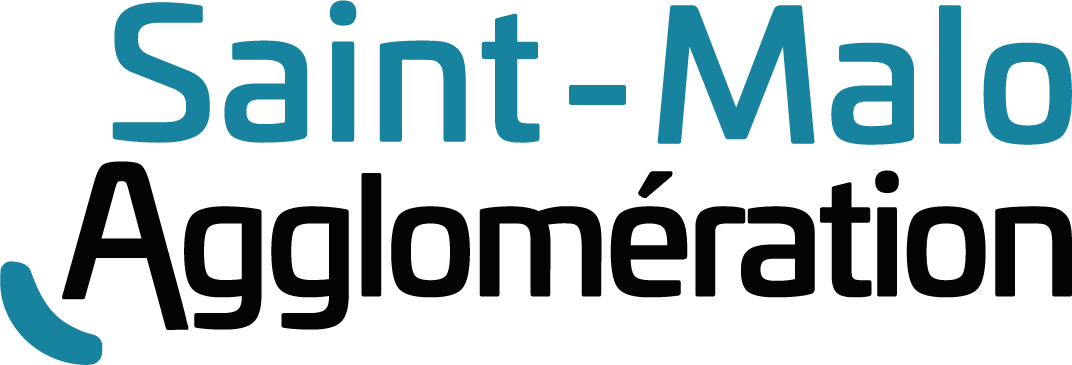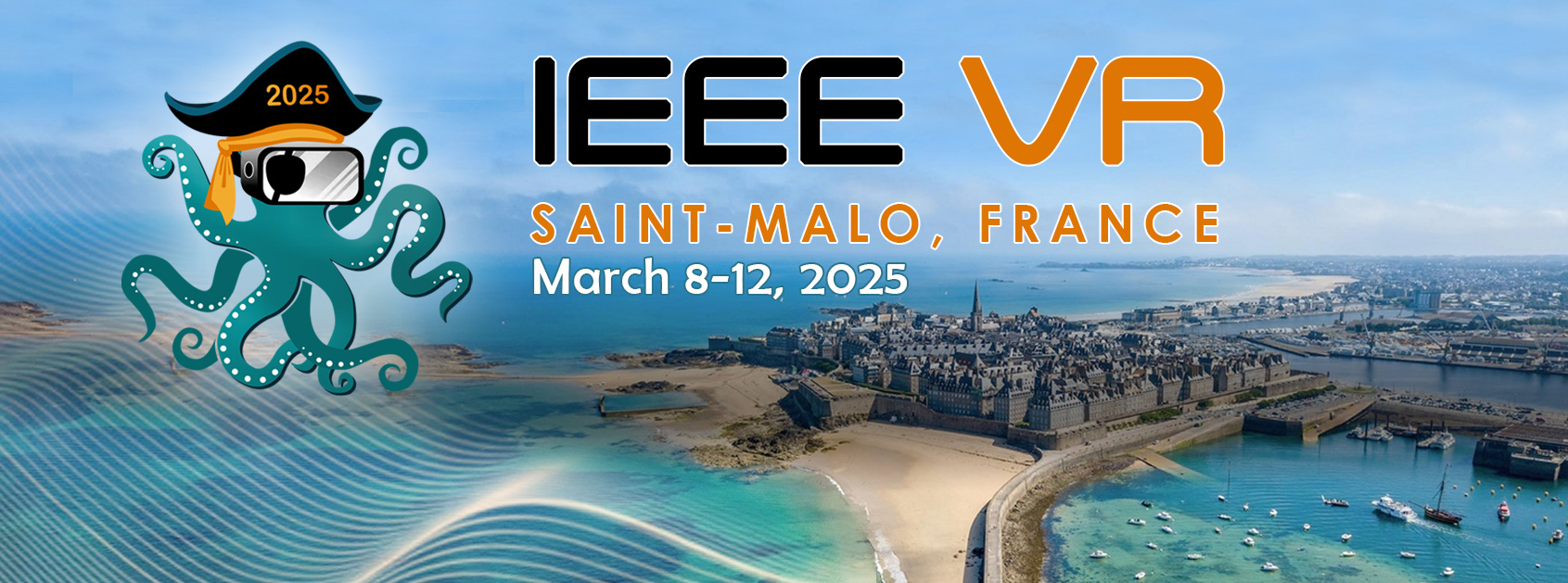
Workshops
Workshop: 8th IEEE VR Internal Workshop on Animation in Virtual and Augmented Environments (ANIVAE)
Saturday 8 March, 8:30-12:30 (Saint-Malo, France UTC+1), Room: Bouvet
Animation is a comprehensive and heterogeneous media form. Often associated with cinema and television, animated images have entered many areas of life, particularly games, installations, or data visualizations, taking on operative, communicative, epistemic, and didactic tasks, among other things. In this context, Suzanne Buchan (2013) speaks of pervasive animation, a media world in which animated images are omnipresent. In one of the most innovative fields of media production, augmented and virtual reality, animation is an integral part of artistic, scientific, and economic applications in animated forms as well as mixed with live-recorded footage. In both fields, generative AI is applied in various aspects of production. Within the animation process, it assists, for example, in story development and animatics, character design and animation, or virtual-scene creation. For AR/VR it is not only useful for procedural content creation but also enhances interactive and dynamic environments, scene and context understanding, and creates more complex avatars or non-player characters. Connecting specialists from various digital humanities research areas (such as animation, games, and media studies) with experts from vision-oriented computer science areas (such as computer graphics, information visualization, or AI) and experts from technically oriented computer science areas (such as data integration, internet of things, or smart automation), the ANIVAE workshops aim to create an open and exciting environment. By encouraging synergies of interdisciplinary approaches, the workshop maps animation within the AR/VR context from different angles and creates new knowledge in this research field.
Workshop: 1st Workshop Archaeology and cultural heritage through XR (ARCHERIX)
Saturday 8 March, 14:00-18:00 (Saint-Malo, France UTC+1), Room: Bouvet
In the same way as 3D, innovative uses for XR are beginning to emerge in the field of historical sciences, on the initiative of archaeologists, anthropological biologists, paleopathologists and conservator-restorers. These technologies are opening up a new era in the knowledge, conservation and dissemination of archaeological and more generally cultural heritage data. Fundamentally interdisciplinary, they are revolutionizing practices and raising new concerns and issues. XR based methods provide powerful interactive and non-destructive access to fragile historical material and immediate information. Furthermore, new approaches that combine analytical tools (ct-scan, archaeometry) and AI based methods to XR might benefit the cultural heritage domain, providing high-resolution digital twins of movable or immovable artifacts that allow for digital restoration, prediction of future (de-)generative natural processes, scientific exploration and communication to a broader audience. In addition, XR provides a powerful opportunity for the preservation and dissemination of intangible heritage such as traditional culture and folklore. However, the production of heritage related environments in XR raises a number of questions of both a methodological and technical nature. Indeed, the nature and construction of such interactive 3D digital environments combine real elements, or at least those obtained by digitizing the real thing, with interpreted elements. The latter may be linked to a previous complete environment to represent missing elements, or to data created by the users during virtual work sessions to enrich the environment with the help of tools offered to them. It is important to define a methodology for controlling and representing these different levels of data in the XR environment, and to assess the cognitive relationship between the expert users and these representations. The goal of this interdisciplinary workshop is to bring together in one place researchers specialized in XR and CH users such as archaeologists, restorers and curators. While each participant will contribute his or her own expertise, experience and point of view, the workshop should also serve to strengthen cooperation and partnerships between disciplines.
Workshop: Emerging Novel Prototyping Techniques for XR (ENPT-XR)
Saturday 8 March, 8:30-12:30 (Saint-Malo, France UTC+1), Room: Lamennais 1
The primary goal of this half a day workshop is to foster a collaborative environment where researchers and industry practitioners from diverse backgrounds can come together to explore and shape the future of prototyping in the realms of Virtual Reality (VR), Augmented Reality (AR), and 3D User Interfaces. It aims to provide a platform for discussing the latest advances in rapid prototyping techniques for Extended Reality (XR). Additionally, it serves as a forum for sharing ideas, formulating unifying theories, and pinpointing research opportunities, establishing a community, all aimed at advancing the field of XR prototyping.
Workshop: 2nd Workshop on Gaze and Eye Movement in Interaction in XR (GEMINI)
Saturday 8 March, 14:00-18:00 (Saint-Malo, France UTC+1), Room: Maupertuis
Where we look reflects our information needs and guides our movements and actions. As gaze is so central to our interactions, it has been studied for human-computer interaction (HCI) for as long as we have had modern computer interfaces. The 2nd Workshop on Gaze and Eye Movement in Interaction in XR (GEMINI) aims to reflect on the research agenda for gaze- based interaction in extended reality (XR). This is especially important due to the growing integration of eye-tracking technology in modern headsets, which presents significant research opportunities. Researchers and practitioners are invited to contribute and discuss their original research, opinions, and work-in-progress that explore the intricacies of gaze in XR. This workshop aims to bring together researchers and practitioners from different domains to discuss gaze-based research, such as 3D user interfaces, applications, and gaze analysis in XR, and to reflect on the current state and future directions of gaze-based interaction in XR.
Workshop: Generative Artificial Intelligence meets Extended Reality (GenAI-XR)
Saturday 8 March, 8:30-12:30 (Saint-Malo, France UTC+1), Room: Maupertuis
The GenAI-XR workshop aims at exploring the intersection of Generative Artificial Intelligence (GenAI) and Extended Reality (XR), examining their combined potential to revolutionize various sectors including entertainment, arts, education, factory work, healthcare, architecture, and others. The workshop will provide a platform for researchers, industry professionals and practitioners to discuss innovative methods of integrating GenAI into XR environments, enhancing immersive experiences and personalizing interactions in real time. Through presentation and discussion sessions, participants will gain insights into the latest developments, challenges, and future directions at the interseaction of GenAI and XR.
Workshop: 2nd Workshop on Inclusion, Diversity, Equity, Accessibility, Transparency, and Ethics in XR (IDEATExR)
Saturday 8 March, 14:00-18:00 (Saint-Malo, France UTC+1), Room: Lamennais 4/5
The potential benefits of XR should be for all, regardless of their cultural background, gender identity, race, neurodiversity, ethnicity, economic status, age, etc. However, our community is still facing challenges preventing equal involvement. Most research within this space relies on the M-WEIRD user populations and is done by M WEIRD researchers (Male, White, Educated, Industrialized, Rich, and Democratic), effectively missing most of the world’s population, thus hindering the generalizability of findings and diversity of ideas. Approximately 95% of the global population is excluded from VR research and only 15% of first-paper authors at IEEEVR are women. Moreover, the ethics informing XR research have been identified as one of the grand challenges facing human-computer interaction research today, with the replication crisis featuring transparency as a critical step for remediation. These factors make formal discussions surrounding inclusion, diversity, equity, accessibility, transparency, and ethics in XR not only timely but also necessary. And we want you to be part of this. It’s important to note that these concerns are also relevant to technical work not involving human participants as they also play a role in research teams, ideas, proposed solutions, conduct, etc. This workshop has six facets: inclusion, diversity, equity, accessibility, transparency, and ethics. We expect researchers to submit early work that has already shown a commitment to one or more of these aforementioned facets. This could include work with diverse participants, work examining skin-tone rendering in AR, computer vision algorithms for differently-abled hands, testing of accessibility and usability of a VR app for those with different sensory abilities, etc. Further, while we anticipate this next type of paper to be rarer, we anticipate papers that feature research explicitly regarding the realm of diversity in XR. Finally, position papers informed by either a survey of the literature or profound experience in the facets of this workshop are also well within our scope.
Workshop: 3rd Workshop on Immersive Visualization Laboratories - Past, Present and Future (IVL)
Sunday 9 March, 14:00-18:00 (Saint-Malo, France UTC+1), Room: Lamennais 3
Over the past 30 years, many research organizations established large-scale immersive visualization laboratories. Some have been very successful, but others are no longer around. With the recent availability of COTS virtual reality devices, the need for larger immersive visualization laboratories comes into question. Some immersive visualization laboratories have moved away from large scale facilities due to the cost of maintaining these more elaborate systems. But can immersive visualization requirements be satisfied solely using COTS VR devices used by researchers in their own office? The goal of this workshop is to gather practitioners from immersive visualization laboratories to share their success stories, information about their hardware setups and the software they used and/or developed. Discussion can also include not-so-successful stories with lessons learned and workshop participants will also come together to discuss the future of large-scale immersive visualization labs. We also hope to bring visualization practitioners together to advance the way our field works with immersive visualization hardware and software frameworks for a sustainable immersive visualization laboratory.
Workshop: 2025 IEEE VR KELVAR Workshop: K-12+ Embodied Learning through Virtual and Augmented Reality (KELVAR)
Saturday 8 March, 8:30-12:30 (Saint-Malo, France UTC+1), Room: Lamennais 3
K-12+ (K-12 and higher ed) education is currently undergoing a technological revolution creating opportunities for Virtual-, Augmented-, and Mixed-Reality based learning (hereafter referred to as XR [extended reality] technologies. Technology integration will continue to increase as mobile devices penetrate all socioeconomic strata, and as XR technologies become affordable to schools, vocational education providers, universities, and informal educational settings delivered by cultural institutions such as museums, libraries and galleries. These technologies have the potential to facilitate effective learning by: developing the ability to engage students of all ages with interactive 3D simulations of real-life and artificial phenomena; presenting information that is spatially – and temporally – integrated with real objects; leveraging whole-body motions to depict and reinforce learning content. However, there are many questions about the integration of such experiences into the classroom, such as: What curriculum topics might be addressed through XR technologies? What socio-cultural, psychological and physiological mechanisms underlie embodied cognition? How can we design educational experiences that are appropriate for the different stages of human development? How will pedagogical and assessment approaches be influenced by such technologies? In this workshop we aim to bring together educators, developers and researchers who are interested in creating and deploying XR technologies for the educational contexts of the future. The workshop will enable participants to discuss and engage with different approaches for designing and integrating XR technologies with a specific focus on the challenges and potential for embodied learning in the classroom for K-12, vocational and higher education.
Workshop: 3rd Workshop on Locomotion and Wayfinding in XR (LocXR)
Saturday 8 March, 8:30-12:30 (Saint-Malo, France UTC+1), Room: Lamennais 4/5
This Workshop on Locomotion and Wayfinding in XR is intended to initiate novel and deepen existing discussions between researchers and practitioners interested in the broad area of navigation in extended reality. While navigation is one of the most fundamental forms of user interaction required in almost every XR application, existing research still leaves a plethora of open research questions regarding the conceptual design, technical realization, and systematic evaluation of navigation interfaces for particular use cases. This iteration of the workshop sets a particular focus on the topics of accessibility and standardization in navigation research. The workshop aims to thematize these issues in more detail and offer a platform for discussing current and future research projects in the field with the community.
Workshop: 3rd Multi-modal Affective and Social Behavior Analysis and Synthesis in Extended Reality (MASSXR)
Saturday 8 March, 14:00-18:00 (Saint-Malo, France UTC+1), Room: Surcouf
The 3rd MASSXR Workshop will explore the intersection of XR technologies and socio-technical security, focusing on the challenges and advancements in building secure, privacy-conscious, and trustworthy XR systems. As XR continues to evolve, we aim to address key research questions and emerging topics, such as: ● How can we generate and analyze affective and social behaviors in XR? What are the latest techniques in this area? ● What are the latest advancements in safeguarding XR systems against privacy breaches and security vulnerabilities? How can we improve detection and mitigation strategies for reliable user protection? ● What are the current best practices for responsibly collecting, managing, and securing user interaction data within XR environments? How can data security be balanced with personalized experiences, and what privacy-aware innovations (e.g., for privacy-sensitive data recording, compression, or other management techniques) are emerging to support this? ● How can we enhance trust in XR applications through transparent data practices and robust identity management? What roles do authentication protocols, encryption, and user control mechanisms play in establishing trustworthy systems? ● What approaches (e.g., tools, techniques, methodologies) are emerging for providing secure, privacy-preserving, and resilient interactions in XR environments? How can AI-based solutions support dynamic risk assessment and personalized security controls? ● How XR systems could be used to increase the security of other systems? What are the latest methods for using XR technologies in threat detection, authentication, and real-time security monitoring?
Workshop: Mixed Reality Safety and Interaction (MRSI)
Sunday 9 March, 14:00-18:00 (Saint-Malo, France UTC+1), Room: Lamennais 1
As Mixed Reality (MR) aims to be more prevalent in homes, schools, and workplaces, user comfort, health, and safety become increasingly important factors. Users should have confidence engaging with MR experiences, and feel comfortable and safe doing so for long periods of time. Comfort concerns can lead users to avoid or prematurely decline to use MR, even when the concerns can be mitigated. For example, in MR, some degree of visually induced motion sickness (VIMS) is reported by 30-40% of users, and these effects can persist for several hours after the experience. Costello divides health and safety concerns into physical, physiological, and psychological factors. These factors should be considered across the population, including children, elderly, or people with disabilities or for specific professionals such as industrial workers or medical professionals. Furthermore, MR experiences allow users to interact with virtual and physical elements simultaneously which makes for a compelling experience. This means virtual content overlapping physical entities or physical elements interacting with virtual elements. Such experiences can afford various interactions for the users, however the user may need to calibrate to more than 1 frame of reference in such situations. For example, when using their real hands to grab a virtual object that is overlaid on top of the real world (RW), the user has to perceive the distance of the virtual object in relation to the RW while also referring back to their internal body schema. The three things may not be aligned causing more cognitive load for the user resulting in a poor user experience. Additionally, there are depth and occlusion considerations to determine how successful certain actions will be. Depending on the relation between the virtual and the physical, the perceived affordance of actionable space may be inaccurate. In other words, a virtual object might appear reachable but it is beyond grasp. There are relatively few venues for discussing challenges associated with comfort, safety. and affordances in MR, particularly across ages and/or special populations. This workshop will provide an opportunity for academic and industry researchers to share their insights via presentations and active discussions. Providing both structured and more free-flowing options to share ideas will foster conversations and shared knowledge.
Workshop: Next Generation of Avatars (NGA)
Saturday 8 March, 14:00-18:00 (Saint-Malo, France UTC+1), Room: Lamennais 3
Recent advances in deep learning, neural representations, and physics-based character simulation... have contributed to a breakthrough in avatar design, simulation, control and rendering. Computer vision now enables detailed and accurate pose and shape capture with affordable systems (e.g. a single RGB camera) in real-time, and to build controllable representations of specific users instead of anonymous virtual humans. In particular, advances in image-based rendering, such as NERF or Gaussian Splatting, also offer new challenges to control high quality avatars, opening new questions about avatar control, and its impact on human experience in VR. Novel view synthesis based on sparse views of the user may be a promising alternative to traditional character simulation, especially in teleoperation and telepresence applications, among many others. Furthermore, motion control including retargeting and interaction are still open and difficult problems, that may benefit from the above-mentioned new representations. How to retarget the motion of the user on an avatar simulated with these new representations? In traditional rendering pipelines, how to benefit from new information, such as the surface of the user, to adapt the pose of the avatar in real-time? Alternatively, how to control this avatar, with all the possible representations, using only a few sensors (e.g. controllers, inertial sensors...)? All these new possibilities may have various impacts on the user experience. How can new representations, new control metaphors or devices, and new ways of doing character simulation, enhance the VR experience of users? How can we evaluate these new methods to measure the degree of interaction, embodiment, agency, and impact? What are the potential risks and limitations of these approaches from the user perspective? The goal of the workshop is to discuss different aspects of the most recent works in this domain, and explore how it would impact future research in VR. After scientific presentations, showcasing the latest research advances in avatar representation, simulation and control, a round table will help to imagine the next generation of avatars, and their impact on user experience.
Workshop: Novel Input Devices and Interaction Techniques (NIDIT)
Sunday 9 March, 8:30-12:30 (Saint-Malo, France UTC+1), Room: Lamennais 4/5
We propose to hold the 6th workshop on Novel Input Devices and Interaction Techniques (NIDIT). The goal of NIDIT is to drive forward innovation in hardware and software for 3D interactive systems. We will seek submissions presenting new input devices and/or interaction techniques and/or 3D user interfaces (3DUI) in 3D/spatial situations, including virtual reality (VR), augmented reality (AR), and mixed/extended reality (MR/XR).
Workshop: Philippe Coiffet International Memorial Workshop (PCIMW)
Sunday 9 March, 14:00-18:00 (Saint-Malo, France UTC+1), Room: Lamennais 2
This Memorial Workshop primary goal is to celebrate the life and immense professional contributions Professor Philippe Coiffet made to the fields of Virtual Reality and Robotics. The secondary goal is to stimulate a healthy exchange of ideas between generations of scientists and engineers he formed, and see where they are today. Finally, since Professor Coiffet was also a founding Fellow of the French Academy of Technologies, we also aim at making this important organization better known internationally.
Workshop: Perception-driven Graphics and Displays for VR and AR (PerGraVAR)
Saturday 8 March, 8:30-12:30 (Saint-Malo, France UTC+1), Room: Lamennais 2
In the last decade, a range of high-quality HMDs has become available on a commodity level. While pixel densities and the dynamic range increase, the refresh rates are getting higher and higher, and display latencies are continually reduced. Currently, novel technologies such as displays with a growing number of displayed views per pixel (ranging from stereo, multi-view, holographic, lightfield displays, optical see-through, and video pass-through displays) are being released to the market. These advancements not only enhance visual experiences but also highlight the need for improved interoperability across XR platforms, addressing challenges in ensuring consistent performance and user experience across diverse devices. Likewise, multi-layered displays and adaptable lenses are integrated into head-mounted devices. Prototypes for retinal displays and bionic contact lenses have begun to emerge. All these advances in display technologies will tighten the requirements for image synthesis techniques. Today, displaying realistic-looking graphics at high refresh rates is already computationally demanding, especially for high pixel densities, a wide Field of View (FoV), and when rendering in stereo. Also, as the size of datasets continually increases, a larger FoV makes it possible to present more of this information at once. It is evident that this divergence between display technologies and rendering techniques will cause significant issues on the technical side (e.g., limited computing power, bandwidth, battery life, power consumption, and heat generation) and can have severe implications on the mental and cognitive load. Understanding these implications is crucial for developing systems that enhance user experience without overwhelming users. However, the visual system has some limitations and the highest possible visual quality is not always necessary. The knowledge of those limitations can be used to develop more efficient rendering systems, e.g., by foveating pixel density. Today, displays allow for more direct and complete addressing of the human visual system and eye-tracking hardware enables to perform active measurements of the gaze. Therefore, knowledge about perceptual processes is gaining increasing importance. Yet no platform allows for discussing those techniques and systems that take advantage of the human visual system under a common banner. This workshop aims to bring together a group of experts to discuss perceptual findings, identify challenges, and present the latest research in the field of perception-driven rendering and perceptual displays. The gained knowledge, for example on display technologies, new interactive rendering techniques, eye tracking systems, and how to optimize the aforementioned techniques to be congruent with human capabilities and limitations will provide novel methodologies and systems.
Workshop: 3D Reconstruction, Digital Twinning, and Simulation for Virtual Experiences (ReDigiTS)
Sunday 9 March, 8:30-12:30 (Saint-Malo, France UTC+1), Room: Lamennais 2
Today, Virtual Reality (VR) technology is becoming foundational across a wide range of application domains, alongside other immersive technologies within the Extended Reality (XR) spectrum. Areas in which XR technologies and, in particular, immersive experiences have been successfully introduced are expanding daily, from traditional areas, such as entertainment and video game production, to novel scenarios, such as industry, healthcare, smart cities, and autonomous vehicles, to mention a few. The spread of VR is also driven by technological advancements that are making easier, and sometimes even possible, new ways of operating within virtual experiences. In particular, the availability of new hardware and software tools makes the use of “3D reconstructions”, “digital twins” and “simulations” commonplace in many XR applications. For example, the possibility to leverage networks with higher bandwidth than ever before and lower latency makes it possible to transmit the amount of data needed for massive, real-time digital twins, whereas high-performance hardware enables the reconstruction of high-fidelity digital objects and environments while lowering the time needed for high-demanding simulations. This workshop aims to attract a collection of high-quality submissions reporting research activities targeting the next generation of immersive experiences, reporting the latest ideas, methodologies, applications, evaluations, case studies, prototype implementations, preliminary results, and demos concerning 3D reconstruction, digital twinning, and simulation in VR and related technologies.
Workshop: 1st International Workshop on Real and Virtual Spaces Influences (ReViSI)
Saturday 8 March, 14:00-18:00 (Saint-Malo, France UTC+1), Room: Lamennais 1
This will be the first edition of the workshop, designed to bring together researchers from diverse fields to promote a multidisciplinary conversation around a key question: how do real and virtual environments reciprocally influence each other? More specifically, we aim to answer questions like, “Can stimuli from the real world affect a person’s sense of presence in Extended Reality (XR)?”, and “Can virtual stimuli alter how people perceive the real world?”. We invite students, PhD candidates, postdoctoral researchers, and faculty working in XR and cognitive psychology – especially those focused on ecologically valid experiments – to participate. We especially encourage contributions from researchers interested in exploring the interaction between real and virtual stimuli, not only to enhance the sense of presence within virtual environments but also to develop more effective applications for training and rehabilitation.
Workshop: Social Interaction and Collaboration in eXtended Reality (SIC-XR)
Sunday 9 March, 8:30-12:30 (Saint-Malo, France UTC+1), Room: Lamennais 1
The workshop “Social Interaction and Collaboration in eXtended Reality (SIC-XR)” is an opportunity to explore the dynamics of social interaction and collaboration in immersive technologies, with a specific focus on eXtended Reality (XR) applications, including augmented reality (AR), virtual reality (VR) and mixed reality (MR) environments. As the use of these technologies expands in contexts such as remote work, education, and healthcare, it is essential to understand and optimize how people interact and collaborate in virtual environments. The goal of the workshop is to bring together researchers, practitioners, developers, and interaction design experts to discuss current challenges and future potential in the area of social interaction and collaboration in XR.
Workshop: Sonic Interactions in Virtual Environments (SIVE)
Sunday 9 March, 14:00-18:00 (Saint-Malo, France UTC+1), Room: Surcouf
Sonic interaction design is defined as the study and exploitation of sound as one of the principal channels conveying information, meaning, and aesthetic/ emotional qualities in interactive contexts. This field lies at the intersection of interaction design, and sound and music computing. In the virtual reality community, the focus on research in topics related to auditory feedback has been rather limited when compared, for example, to the focus placed on visual feedback or even on haptic feedback. However, in communities such as the film community or the product sound design community, it is well known that sound is a powerful way to communicate meaning and emotion to a scene or a product. This workshops main goal is to increase awareness among the virtual reality community of the importance of sonic elements when designing virtual/augmented/mixed reality environments (XR hereafter). We will also discuss how research in other related fields such as film sound theory, product sound design, sound and music computing, game sound design, and accessibility can inform designers of XR environments. Moreover, the workshop will feature state-of-the-art research on the field of sound for XR environments.
Workshop: 6th Annual Workshop on 3D Content Creation for Simulated Training in eXtended Reality (TrainingXR)
Sunday 9 March, 14:00-18:00 (Saint-Malo, France UTC+1), Room: Vauban 1
This workshop discusses and articulates research visions on using the latest extended reality (VR/AR/MR) technologies for education and training purposes and on creating immersive 3D virtual content for delivering effective and personalized training experiences. This workshop will gather researchers and practitioners in various computer disciplines related to XR training and content creation. This workshop will accept research papers on these topics. We will also invite renowned speakers from the research community and the industry to give research talks about XR-based training to inspire the field to explore this promising direction further.
Workshop: 9th Workshop on Virtual Humans and Crowds in Immersive Environments (VHCIE)
Sunday 9 March, 8:30-12:30 (Saint-Malo, France UTC+1), Room: Lamennais 3
Today, as virtual reality (VR) continues to evolve, various tools—including algorithms and systems—enable the creation and design of believable virtual humans and crowds in immersive virtual environments (IVEs), making this area increasingly important. Sophisticated crowd simulations can efficiently populate city-sized environments with thousands of realistic virtual characters, called virtual agents, interacting with each other and with users. However, several challenges remain, particularly regarding the multimodal representation of interactions (such as haptic feedback for physical collisions, sound integration, etc.), the responsiveness of virtual humans at both verbal and non-verbal communication levels, and understanding the individual and situational factors affecting social interactions in populated environments. In addition, accessibility in virtual environments is an increased area of focus within the VR community. Ensuring that these social interactions are accessible to users of all abilities is essential. This includes addressing challenges like enhancing user interfaces for diverse needs, creating more inclusive social virtual spaces, and developing tools that support a wider range of physical and cognitive abilities, making virtual reality a more universally accessible medium for all. The goal of the VHCIE workshop is to foster discussions on the latest research related to these issues in a cross-community approach. Thus, we invite research contributions not only from the VR community but also from fields that contribute to understanding human behavior during social interactions - especially work with potential applications in VR or those exploring how to transition to VR settings. The deadline for submitting scientific papers to be included in the Abstracts and Workshop Proceedings of IEEE VR 2025 is December 20th, 2024, while the submission deadline for late-breaking reports is February 7th, 2025.
Workshop: The 1st International Workshop on Virtual Reality for Human and Spatial Augmentation (VR-HSA)
Sunday 9 March, 8:30-12:30 (Saint-Malo, France UTC+1), Room: Surcouf
The VR-HSA workshop aims to unite experts and researchers in virtual reality, human augmentation, and spatial augmentation to explore cutting-edge innovations and address critical challenges. The workshop aims to create a collaborative environment where participants can share advancements, novel approaches, and research findings. By fostering interdisciplinary discussion, the event will focus on pushing the boundaries of human and spatial augmentation through VR technologies. The workshop also seeks to stimulate partnerships across academia, industry, and other sectors, driving forward the future of these transformative technologies. Ultimately, the goal is to inspire new research directions, facilitate knowledge exchange, and build a global network dedicated to advancing the capabilities of VR in augmenting human abilities and expanding spatial environments.
Workshop: IEEE VR Workshop on Immersive Sickness Prevention (WISP)
Saturday 8 March, 14:00-18:00 (Saint-Malo, France UTC+1), Room: Lamennais 2
Cybersickness remains one of the most significant challenges facing the virtual reality industry. Although immersive technologies have been advancing rapidly, their rate of public adoption has been slowed by the fact that many users experience physical discomfort during or after the use of VR devices, with symptomatic characteristics similar to motion sickness. Furthermore, studies have consistently shown that motion sickness disproportionately affects women, and concerns have been raised about the existence of inequitable barriers for engaging with immersive media.
Workshop: 2nd Workshop on Seamless Reality: AR Technologies for Seamless Perception and Cognition between Cyber and Physical Spaces (WSR)
Sunday 9 March, 8:30-12:30 (Saint-Malo, France UTC+1), Room: Maupertuis
In this workshop, we explore the theme of Seamless Reality. By the term we envision the seamless integration of cyber and physical spaces, following the development of VR/AR display technology and perception understanding. We define Seamless Reality as a concept that seamlessly integrates physical perception with behavior and cognition between cyber and physical spaces. Through this workshop, we aim to promote research on the fundamental technologies for realizing Seamless Reality, including AR display systems that enhance the realism of virtual images, AR representation design applying insights from visual cognition and psychology, and physical interactions with AR representations based on changes in physical space and haptic feedback.
Workshop: 3rd Workshop on XR Technologies for Healthcare, Wellbeing, and Medicine (XR Health)
Saturday 8 March, 8:30-12:30 (Saint-Malo, France UTC+1), Room: Surcouf
This IEEE VR 2025 workshop focuses on eXtended reality (XR; umbrella term for AR/VR/MR) technologies to help in the broad areas of interest related to healthcare, wellbeing and medicines. With the increasing adoption of XR devices, the workshop aims to explore their potential to enhance healthcare practices and improve individual wellbeing. While XR has shown significant advantages in various healthcare areas, further research is essential. The workshop seeks to unite researchers from the Human-Computer Interaction (HCI) community to share insights and address challenges in XR for healthcare. The workshop invites short paper submissions, with one author needed to present their work talks. Breakout sessions will facilitate in-depth discussions, and invited talks offer diverse perspectives on XR advancements. A primary goal of XR Health 2025 is to connect international researchers in medical, health, and wellbeing XR applications. The workshop provides a platform for early-career researchers to present their work and engage with experienced professionals. We further invite students in this field to contribute to our present your thesis speed dating session, allowing PhD candidates to briefly showcase their thesis projects in 1-2 minutes, fostering quick exchanges of ideas.
Workshop: The 4th International Workshop on eXtended Reality for Industrial and Occupational Supports (XRIOS)
Sunday 9 March, 14:00-18:00 (Saint-Malo, France UTC+1), Room: Maupertuis
The eXtended Reality (XR) technologies have been applied to a wide range of industries and occupational areas for maintenance, quality control, training, education, remote collaboration, etc. The industries can benefit from XR by providing their employees with timely and efficient instructions. The users can improve their work performance while reducing mental and physical workload through effective XR systems. However, as workplace conditions become diverse, the XR technologies should be adaptive and innovative to meet the new industrial needs. Furthermore, as XR applications supporting industrial and occupational tasks include physical movements and activities, it is necessary to perform a variety of assessments from ergonomics and physiological perspectives. This workshop—eXtended Reality for Industrial and Occupational Supports (XRIOS) — aims to identify the current state of XR research and the gaps in the scope of human factors and ergonomics, mainly related to the industrial and occupational tasks, and discuss potential future research directions. XRIOS will build a community that bridges XR developers, human factors, and ergonomics researchers interested in industrial and occupational applications.
Workshop: 1st International Workshop on Spatial Memory in XR (XRMemory)
Sunday 9 March, 8:30-12:30 (Saint-Malo, France UTC+1), Room: Vauban 1
The goal of this workshop is to explore technologies enabling immersive, memory-rich experiences, allowing users to revisit moments as if they were truly back in those spaces. While traditional media such as photos and videos have long served as tools for recalling past experiences, the increasing accessibility of AR/VR HMDs and the progress in spatial computing now open doors to far more immersive and realistic forms of memory recall across time and space. This workshop aims to bring together experts across AI, XR, AR/VR, graphics, computer vision, and large language models (LLMs) to investigate the technological foundations for capturing, recreating, and sharing these limitless spatial experiences. By fostering discussions on how these interdisciplinary technologies can enable richer, more vivid forms of memory retention and experience sharing, we hope to reshape the way of reminding memory across the limits of time or place.
Workshop: 1st Workshop on XR Accessibility (XRaccess)
Sunday 9 March, 14:00-18:00 (Saint-Malo, France UTC+1), Room: Lamennais 4/5
This workshop convenes academia, industry, and advocacy stakeholders to address the urgent need for accessibility in XR. Accessibility should be a primary design criteria for XR, as retroactive accessibility is never as effective, and acting now will ensure the widest possible access to XR as it proliferates. Aiming to make XR platforms more inclusive, the workshop will provide a collaborative forum to share solutions, research, and hands-on demonstrations for accessible XR. By fostering discussions and connections, the workshop ensures accessibility becomes integral to XR innovation, inspiring new contributors and advancing real impacts in users lives. A goal of the workshop is to engage attendees who are interested in, but not yet working on XR accessibility, and unsure where to start or what to work on.









